- Home
- Andre Farant
Frozen Dinner Page 2
Frozen Dinner Read online
Page 2
opening, the wind searing his face like sunburn, and aimed the flare gun straight up. A hiss followed the pop as the flare arced into the black sky, a red tail trailing it.
They’d see it, Fletcher thought as he ducked back into the plane.
He was about to set the flare gun down when an idea struck him: a fire would feel good right about now. Fletcher propped the open briefcase between the plane’s angled bulkhead and canted floor, bunched a dozen sheets of paper into a small pyramid, then stepped back and reloaded the flare gun. He turned his head away, held his left hand up to his face, aimed with his right, and fired.
The pop—louder indoors—bounced around the plane’s interior like a sonic superball, the hiss was brief as a gasp, and the explosion knocked Fletcher on his ass. A fireball, big and bad as a waking polar bear, leaped from within the briefcase, punching a hole the size of a fist in the angled wall above. Flaming chunks of paper tumbled and drifted while Fletcher, temporarily blinded by the flash, coughed on the smell of sulphur that filled the plane like a fart in an elevator.
Fletcher clambered to his feet, pulled himself out the doorway, and tumbled into the night and snow. As the world tipped, flipped and faded, Fletcher saw pink-tinged smoke pouring out of the plane like an upside-down waterfall of cotton candy, the kind you get at a Rockies’ game, with a hot dog and maybe some fries . . .
He woke to the smell of barbecue. Hot dogs. No, not hot dogs—pork, pork chops. Fletcher flipped onto his side, his stomach tightened, as though squeezed by an angry fist, and he vomited into the snow. Nothing but steaming strings of bile. He sat up, peered up at the plane. A few lazy strands of smoke drifted from the doorway, but the majority of the smoke escaped the downed craft through the hole that had been torn open by the flare.
His head spun as he stood and he feared he’d throw up again. He waited until both his head and stomach settled then clambered, slowly, back into the plane.
Much of the smoke had dissipated and a healthy fire danced within the blackened confines of the briefcase. The cushions of a few seats were singed, but Fletcher noticed no serious damage to the craft. He slipped out of his top layer and sat by the fire, exhausted. The dead woman lay nearby, the light flickering across her cheeks and forehead.
The two near the rear of the plane looked even worse in the light of the fire. Their skin was a greenish-grey and slightly puffy. They looked rotten and Fletcher was glad their frozen state kept them from smelling up the place. In fact, the plane’s interior smelled delicious.
Pork chops. Fletcher still smelled barbecued pork chops. His stomach lurched, as though trying to escape his useless body to seek out the source of the aroma on its own. He looked around, following the scent, and his eyes landed on the pilot. The pilot was on fire.
A scrap of flaming paper or gob of phosphorous must have landed on the dead man, for his head was a blackened, peeling lump and he’d sprouted a crewcut of flames. Fletcher scrambled to the open emergency kit, grabbed the blanket, and tossed it onto the flaming airman. The blanket fell over the pilot’s head and shoulders, smothering the fire. A ring of pork-scented smoke wafted out from under the blanket, the smell of which brought Fletcher to his knees.
He crawled back to his briefcase campfire, shut his eyes, tried to sleep, but could not ignore that smell. It tore at his nostrils, twisted his guts.
The pilot sat under his shroud, like pork chops under a barbecue lid.
Fletcher opened his eyes but kept them on the campfire.
Lift the barbecue lid, there are pork chops under there.
Fletcher stumbled to the pilot’s side, grabbed one end of the blanket, lifted, and was assaulted by a fresh gust of cooked meat. He turned away, his belly clawing at him from within.
He wouldn’t be the first. Those Brazilian guys, the soccer players, they’d done it. And he’d read about the Donner Party in high school. Hell, what choice did he have? Push had already come to shove and, with the plane bereft of proper food, he’d just been body-checked into a corner.
He peeked under the blanket. The pilot’s head looked shrivelled, meatless. Just bones covered in soot. What Fletcher smelled—that mouth-watering aroma—was all that remained of the dead man’s face: atomized flesh floating on currents of air.
There was nothing left.
Besides, Fletcher wasn’t sure he could do such an intimate thing to another man; it felt vaguely homoerotic. And those two in the back of the plane, they already looked like spoiled meat. And the woman . . .
The woman lay on her back, her left hand just a foot from the fire. Her coat sleeve was even pulled up slightly, exposing the pale flesh of her forearm, as though in invitation. Fletcher knelt by her. There was a pair of silver scissors in the emergency kit. Her arm was stiff, the flesh hard. He placed one of the scissor blades on the meaty inside of her forearm.
She watched him. Her eyes were open, staring at him like a mounted portrait that follows you wherever you go. He brushed his palm over her eyes but her eyelids would not lower, locked by the cold in their raised position. Finally, Fletcher draped his coat over her face and, satisfied, scraped the scissor blade against the dead woman’s skin, gathering a pink rime along the blade’s edge, and gouging a bloodless furrow in her arm. The accumulated matter looked like freezer-burned ice cream, and Fletcher told himself it was exactly that as he licked it off the blade.
It slid down his throat, cold and vaguely fibrous. He gagged slightly, but his stomach welcomed the frigid paste then rumbled and spasmed, crying out for more. Fletcher scraped off a second helping, licked, swallowed. This time, when his gorge rose, Fletcher nearly lost what little he had ingested. The woman’s raw, frozen flesh was nothing like pork chops, nothing like the scent that still wafted from the pilot’s overcooked head.
Fletcher hooked his fingers under the dead woman’s shoulders and pulled her closer to the fire. Her left hand and forearm lay just inches from the flame and, within minutes, thin streamers of steam began to unfurl from her exposed skin.
Fletcher prodded her arm, found that her flesh yielded to his touch, that he could bend her hand at the wrist. She was thawing.
Despite his stomach’s impatient and noisy protestations, Fletcher waited. He had no idea if human flesh carried e-coli or parasites, and he was in no mood to find out. The last thing he needed was a tapeworm stealing what few calories he managed to ingest. As the woman’s skin began to redden, though, caution fell before hunger and he brandished the scissors again.
Mottled pink and grey, the strip of meat looked like raw bacon and tasted like a thousand orgasms. Fletcher threw back his head, felt drool spill from the corners of his mouth and trickle down his chin. His stomach cheered, then demanded more.
Another strip of warm, fragrant meat. Another. More. The scissor blade sliced faster, deeper, until it scraped bone. Fletcher sat back, intent on pacing himself. Weak as it was, his stomach would be easily strained. As though in thanks and contentment, his belly gurgled and set itself to the nearly forgotten task of digestion.
His hunger satisfied and stomach occupied, Fletcher turned his attention to his surroundings once more, examining them now with eyes no longer blurred by starvation and exhaustion. The dead woman’s arm was a mangled mess, the white bands of her radius and ulna clearly visible at the bottom of the trench Fletcher had dug.
She still looked better than those guys, Fletcher thought, eyeing the two putrefied corpses that seemed to reach out from the rear of the craft. He tapped one on the shoulder, the long-haired one with the missing jaw, and was surprised when it moved, cocking its head to the left.
“Jesus,” Fletcher breathed. He hadn’t noticed how warm it had gotten in the plane. The fire’s heat had built up, filling the craft and thawing the bodies.
Fletcher reached down, grasped the dead man’s right wrist, and lifted it to eye level. The arm offered no resistance and hung like sausage links strung between the dead man’s shoulder and Fletcher’s fingers. The second body, the one with the missing
tooth, had also softened, become more malleable. If these bodies continued to warm, they would soon begin leaking; their flesh was well past their respective expiration dates.
Fletcher looked from the pair of half rotten bodies to the woman’s corpse. How was it that these two were showing signs of early decomposition while the woman and pilots appeared comparatively fresh? If they had died together in the crash, they should all have frozen together as well—unless the two at the rear had already been dead, had already begun rotting before the plane had gone down.
The crate, the plane’s only cargo, contained nothing but the dead man’s disembodied left hand. The hand could have been thrown into the crate during the crash. Then again, maybe the collision had thrown the hand’s owner out. The container’s door hung open, dangling from a single hinge, and, when Fletcher pulled it shut, he saw a symbol stencilled in yellow on its surface: a trio of linked crescents he knew warned of a biohazard. Fletcher stepped away from the crate.
As he passed the jawless corpse, Fletcher noticed something on its neck, just under its right ear. It looked like a tattoo or a brand. He pulled back the dead man’s brittle hair, squinted, and saw the same three semi-circles, the same terrifying warning. He found the mark again—biohazard—on the corpse with the missing

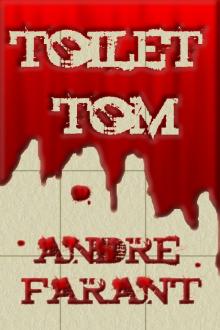 Toilet Tom: A Short Story
Toilet Tom: A Short Story Seafood and Other Stories
Seafood and Other Stories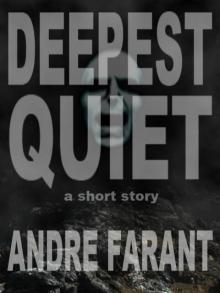 Deepest Quiet: A Short Story
Deepest Quiet: A Short Story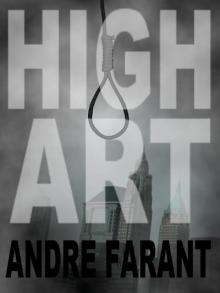 High Art: A Short Story
High Art: A Short Story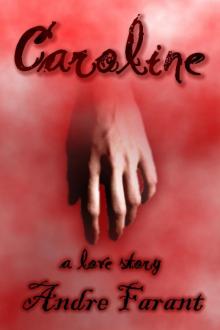 Caroline: A Short Story
Caroline: A Short Story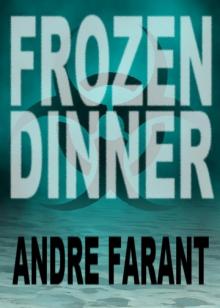 Frozen Dinner
Frozen Dinner